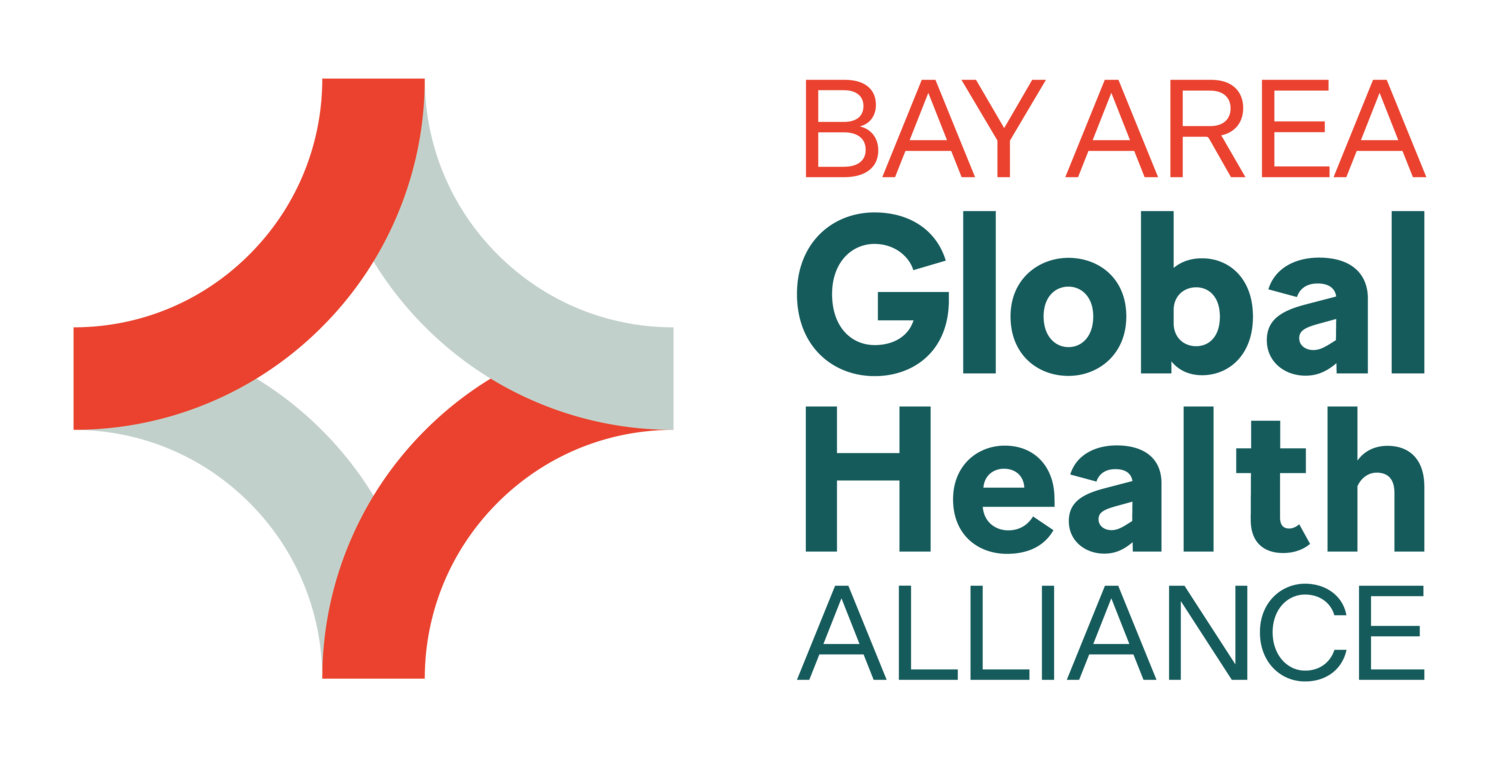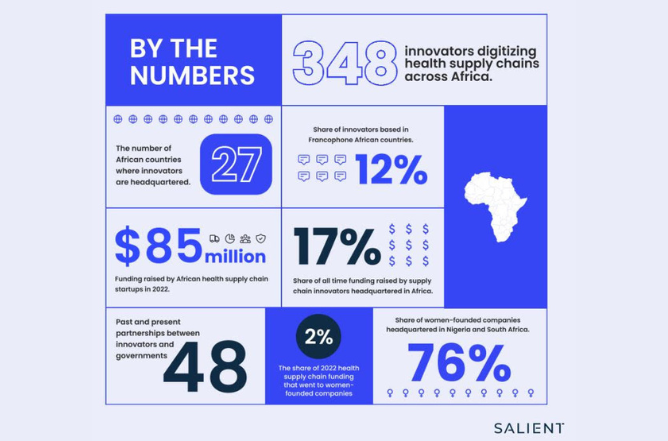You can access the recording here.
“Partnerships between public partners and health supply innovators hold great promise in terms of the impact that they can deliver, but it’s important to point out some of the challenges that we see in these early stages.” – Yomi Kazeem, Engagement Manager, Salient Advisory
On August 8, the Alliance hosted Salient Advisory for a presentation of the key findings, trends, and recommendations outlined in their latest market intelligence report. This report follows Salient Advisory’s pan-African landscaping of nearly 350 digitally-enabled health supply chain innovators. The discussion highlighted challenges and opportunities surrounding scale, partnerships, and access to funding within Africa’s digital health supply chain ecosystem.
Key Takeaways include:
-
The tech hubs of Nigeria, Kenya, South Africa, and Egypt had the most activity, and most innovators provided services only in one country – not scaling to neighboring countries.
-
Government partnerships are key for long-term impact and scale, but those partnerships remain rare among these innovators.
-
Women-founded companies in this space are few and face funding inequities, lacking access to equity financing and are significantly dependent on grants and debt.
-
Two hundred of the nearly 350 innovative companies provide direct distribution to consumers services, with around 100 companies providing services for order and inventory management.
-
After the pandemic’s peak of innovation in 2020, the number of new entrants dramatically declined in 2021 and 2022.
-
Opportunities to create a more equitable innovation ecosystem include: innovative financing solutions to de-risk partnerships; leveraging grants to bridge funding gaps; and investing in implementation research to better measure impact, among other recommendations.
In their research, Salient Advisory classified innovators into five supply chain service categories, shared Dunni Lawal, Senior Engagement Manager at Salient Advisory. “We see the most activity in the first three categories,” Lawal stated, referencing direct distribution to consumers, order and inventory management, and transport, warehousing and reverse logistics as the categories with the highest concentrations of activity and funding.
The greatest number of companies were providers of order and inventory management services – with a handful of the companies in the growth- and mature- stages, and government partnerships, yet relatively low external funding. “This category has possibly been a missed opportunity for foreign investors, who tend to invest in drone and e-commerce companies and technology that they are more familiar with,” Lawal noted.
Yomi Kazeem, Engagement Manager at Salient Advisory, further discussed the skewed funding toward e-commerce giants and medical drone companies.. “It’s important to note that much funding is going to a subset of companies that may have limited impact on actual healthcare distribution,” said Kazeem.
The team identified 48 innovators in the growth- and mature- stage, which Lawal highlighted are “primed for scale, increased impact, and partnerships with public purchasers.” She went on to share that “35% of these companies already have partnerships with governments at national and sub-national levels across the continent,” with Nigerian government agencies leading the way. “Partnerships [with governments] are crucial,” Kazeem emphasized. “The ability to sell to large purchasers like government[s] is absolutely pivotal as innovators pursue long-term scale and impact.”
There are also challenges surrounding these partnerships, Kazeem commented, with “government agencies often struggling with limited financial resources, making it challenging to allocate sufficient funding to service and scale up partnership with an innovator.” Other challenges may include slow and bureaucratic processes and discrepancies in digital literacy levels. “Innovators expressed to us that they have challenges in measuring the impact of their work with governments, mainly due to a lack of data in public sector spaces,” continued Kazeem.
When asked about multi-country scale operations, Lawal noted that most innovators operate in a single country, hindered by factors such as the emerging ecosystem, limited supportive regulations, and the current economic situation.
“Women founders, given the lack of accessibility to equity funding, appear to be more reliant on grants and debt in this space,” Kazeem said. Their research revealed that amongst the male dominated ecosystem, only 8% of companies were solely founded by women, and women-founders were being affected by gender financing gaps.
Despite the challenges faced by innovators across the digital health supply chain ecosystem in Africa, the team also identified key opportunities for stakeholders to systematically accelerate the scaling and impact of innovators and local health supply chains. The team highlighted recommendations such as global health agencies adjusting purchasing processes to engage directly with innovators, establishing innovation support programs, funding implementation research, de-risking partnerships with innovative trade finance solutions, and leveraging grants to bridge funding gaps, especially for women-founders.
For more information, please read Salient Advisory’s report and watch the recording of the discussion.
Speakers:
Dunni Lawal, Senior Engagement Manager, Salient Advisory
Dunni spearheads projects across Salient’s work in market intelligence, strategy and partnerships, helping global clients understand African health tech and take informed action. She has over 10 years experience in organizational transformation, strategic planning, business process optimization and project management.
Prior to joining Salient, she worked as a management consultant at PwC, focused on improving operational efficiency for financial services clients in Nigeria, South Africa and beyond. Dunni holds a Masters in Environment Consultancy from Lancaster University and is a certified Accountant (ACCA) and Project Management Professional (PMP).
Yomi Kazeem, Engagement Manager, Salient Advisory
Yomi leads Salient’s market intelligence on African health tech, tracking companies’ growth and impact, spotting trends and advising global clients. Prior to joining Salient he worked as a reporter for Quartz Media, a New York-based business news outlet and led the publication’s coverage of African startups as well as consistently produced insightful pieces on the biggest trends across the continent’s tech and innovation ecosystems.
He graduated from Babcock University with a degree in International Law and Diplomacy and has previously worked with several leading African media platforms. He was shortlisted for the Michael Elliot Awards for Excellence in African Storytelling in 2019.
ICYMI:
“Locally tailored innovations are showing immense promise to yield benefits for healthcare in African and other low- and middle-income countries,” writes Friends of the Global Fight in its insights report stemming from a convening of African health supply-chain innovators discussing how supply chains can deliver equitable access to health. Co-led by the Bay Area Global Health Alliance, the discussion involved more than 80 global health stakeholders from multiple sectors. The report, “Digitizing Healthcare Demand and Supply in Africa: A People-Centered Approach,” spotlights Salient Advisory’s work and the chatbot technology from Nivi that is increasing access to healthcare in under-resourced communities. Thanks to Chevron for its partnership in these efforts. You can read the report here.

